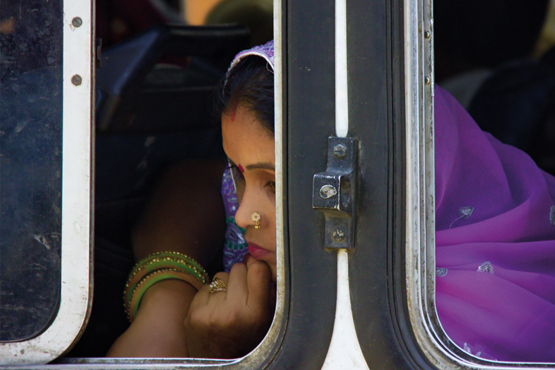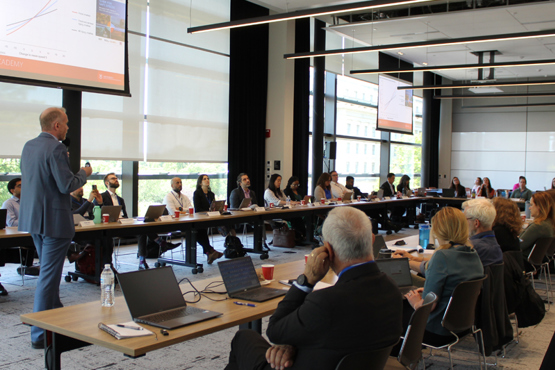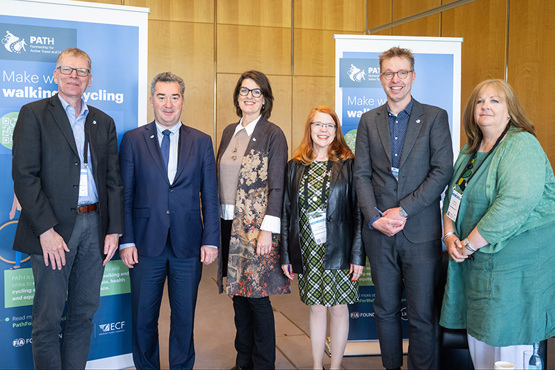Sub-Saharan motorcycle boom puts lives at risk, warns new FIA Foundation report
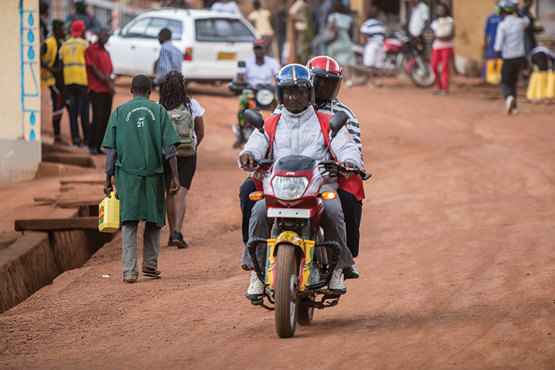
Urgent action is needed to address the boom in sub-Saharan motorcycles to deliver on safety, sustainability, and climate warns a new report by NGO Amend, the FIA Foundation, and the Fédération Internationale de Motocyclisme (FIM).
The report, ‘The Wheels of Change: Safe and Sustainable Motorcycles in Sub-Saharan Africa,' examines the motorcycle boom on the African continent. It makes recommendations with a proposed Action Agenda to maximise motorcycle benefits while managing and minimising their risks. The report identifies that:
- Motorcyclists account for more than half of road deaths, and as high as 70%, in many sub-Saharan countries;
- There are 27 million registered motorcycles in sub-Sahara Africa in 2022, rising from just 5 million in 2010;
- Motorcycles have become significant sources of informal employment with 80% used as taxis or for delivery services;
- Standardised helmet use is the single most effective way of reducing motorcycle head injuries by up to 72% and fatalities by up to 39% (according to WHO). Legislation and enforcement for safe use by riders and passengers alongside certified standards, with robust testing facilities, are needed;
- Anti-lock braking systems (ABS) can reduce fatalities by up to a third. Government-mandated ABS on new motorcycles, as has been recently introduced in China and India, would have a significant impact;
- Road design must consider motorcycle safety, deploying speed reduction and designing appropriate or purpose-built infrastructure;
- There must be urgent emphasis on providing safe, clean and affordable urban public transit to provide genuine alternatives and stem motorisation.
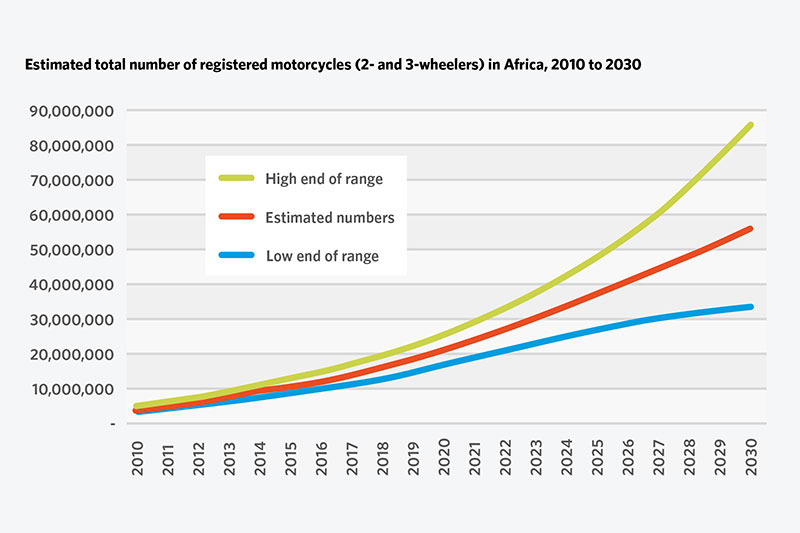
Over the past two decades, the number of motorcycles* in Sub-Saharan Africa** has grown rapidly, driven by low-cost imports and the growth of informal commercial enterprise. They have been used to address mobility gaps in formal and public transport systems, reaching isolated rural areas, offering navigation through overcrowded urban streets, and supporting first and last-mile journeys. Distribution of motorcycles varies by country; Burkina Faso and Mauritius boast the highest proportion by population while Nigeria has the largest number, totalling an estimated 5.1 million. The motorcycle boom supports livelihoods and economies by offering new mobility and commerce options and their use is expected to spread and grow. Young men, who often struggle to find formal economic opportunity in the region, have particularly benefited. Millions of people rely on the sector through ancillary roles.
The health impacts of motorcycles are, however, profound, the report warns. Motorcycle riders account for more than half of all road deaths in some countries: In Togo, the figure is over 70%. More than half of all child pedestrians injured on the roads in Dar es Salaam, Tanzania, are hit by a motorcycle. Road traffic death rates continue to rise across Africa. As well as the risk of injury, there are also wider negative environmental, health and social impacts.
Dr Olive Kobusingye, Distinguished Fellow at the George Institute for Global Health, said: “Transportation systems are failing, unable to meet the needs of the millions of people trying to get into, across and out of the continent’s dense urban centres. Hospitals across Africa are overwhelmed by road traffic injuries, in particular motorcycle-related injuries. African countries need to pay urgent attention to urban transport. Bold and decisive planning and execution are essential to change the overall mobility of our cities.”
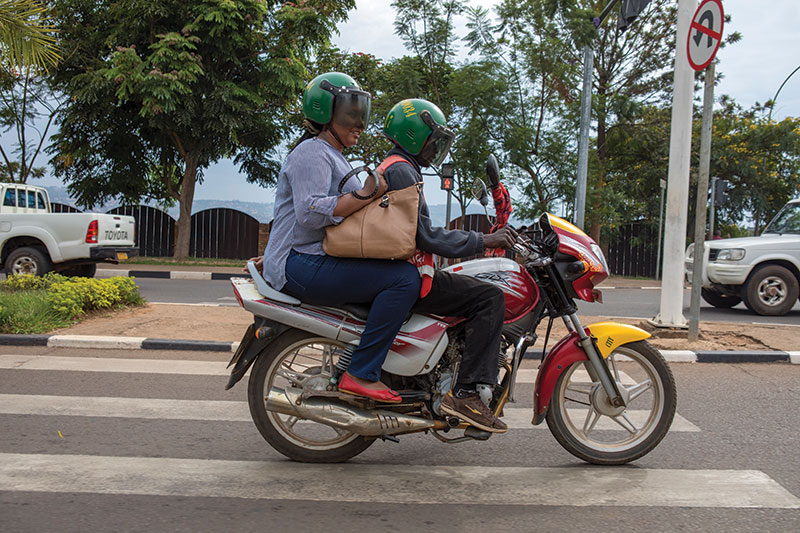
Saul Billingsley, FIA Foundation Executive Director, said: “In the rapid growth of motorcycle use we see the balance between lives and livelihoods played out on the streets. Motorbikes provide relatively cheap transportation, but they are expensive for society in injury and environmental damage. With some African cities predicted to double in size in the coming decade there is an urgent need for an action agenda that both mitigates these negative impacts, with a focus on motorcycle helmets, ABS and electrification while planning for a low carbon future based on widely available, clean public transportation.”
Tom Bishop, Program Director at Amend and the report’s lead author, said: “I wholeheartedly support efforts to develop mass transit systems in African cities, to reduce dependence on private vehicles and to promote walking and cycling, but no matter how much investment and success there is in these areas, motorcycles will still have a part to play in the coming decades. Motorcycles provide mobility, employment and income. Governments, riders’ associations, private companies and international organisations must work together to develop and implement effective and appropriate regulation and training, promote the availability and use of good quality protective equipment and safety technology, consider motorcycles in road design, and support the transition to from petrol-engine to electric motorcycles.”
Jorge Viegas, President of FIM, added: "Africa needs mobility and motorcycles provide it. As a result, Africa is one of the fastest growing regions for motorcycling. This excellent report highlights several solutions for the inevitable challenges this growth brings, but it also notes the significant economic benefits motorcycling brings to the riders and their communities in both urban and rural areas. We are also very pleased to see that the current work to improve safety being undertaken by motorcyclists themselves in the region, such as boda boda associations, has been recognised. Now the focus rightly moves to governments to take up the challenge to make motorcycling in Africa cleaner, safer and more accessible.”

